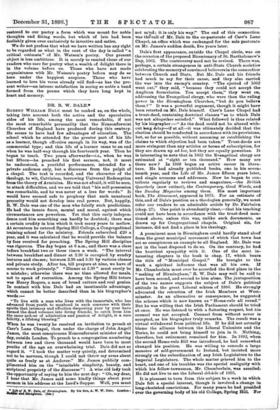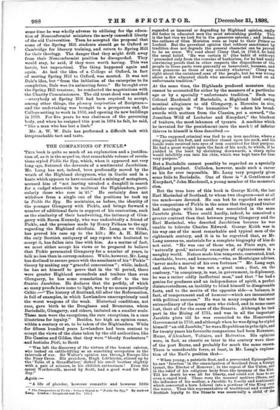DR. R. W. DALE.* ROBERT WILLIAM DALE must be ranked
as, on the whole, taking into account both the active and the speculative sides of his life, among the most remarkable, if not the most remarkable personality that the Nonconformist Churches of England have produced during this century. He seems to have had few advantages of education. The school which he attended for the greater part of his life as a learner, though effective enough in its way, was of the commercial type; and this life of a learner came to an end when he was half-way through his fourteenth year. Then he began to teach. Two years afterwards—i.e., when he was but fifteen—he preached his first sermon, not, it must be understood, a youthful performance, intended for a private audience only, but a discourse from the pulpit of a chapeL The text is recorded, and the character of the theology, to wit, Calvinism, borrowing Universal Redemption from the theory of Arminius. He was not afraid, it will be seen, to attack difficulties, and we are told that "his self-possession
was remarkable, and he was never at a loss for words." It would have seemed safe to prophesy that such unnatural
precocity would not develop into real power. But, happily, R. W. Dale was one of the men who falsify such predictions.
He had the innate force, mental and moral, against which circumstances are powerless. Yet that this early indepen- dence cost him something can hardly be doubted; there was a certain crudity in him which it took many years to mellow.
At seventeen he entered Spring Hill College, a Congregational training school for the ministry. Friends subscribed 220 a year, and it was calculated that he would provide the balance by fees received for preaching. The Spring Hill discipline was rigorous. The day began at 6 a.m., and there was a class before breakfast two or three times a week. "The interval between breakfast and dinner at 2.30 is occupied by sundry lectures and classes; between 2.30 and 5.30 by various classes and private study. After tea, till prayers at nine, we have of course to work privately." "Dinner at 2.30" must surely be a mistake; otherwise there was no time allowed for meals, not to speak of recreation. Among the Spring Hill tutors was Henry Rogers, a man of broad culture and real genius. In contact with him Dale had an inestimable advantage, which cannot be better described than in his biographer's words
"To live with a man who lives with the immortals, who has advanced from youth to manhood in such converse with their spirits that intimacy and affection deepening year by year have turned the dead volumes into living friends; to catch from him the same ardour of admiration and passion of delight, is a rare felicity, a lifelong blessing."
When he was twenty he received an invitation to preach at Carr's Lane Chapel, then under the charge of John Angell James, the most conspicuous Nonconformist minister of the day, outside London. To preach to a congregation numbering between two and three thousand would have been to most youths of the age an overwhelming trial. Dale did not so regard it. "I took the matter very quietly, and determined not to be nervous, though I could not throw my arms about quite as freely as at Andover." Mr. James publicly com- plimented him on the "inimitable simplicity, beauty, and scriptural propriety of the discourse" ! A wise old lady took the opportunity of saying to him the next day : "Oh, my dear, I hear that Mr. James said some kindly things about your sermon in his address at the Lord's Supper. Well, you must
• reffi Gf B. W. Das, of Birmingham. By his E3012, A. W. W. Dale. London /Wier and Otbughton. 1148.]
not meld; it is only his way." The end of this connection was thecall of Mr. Dale to the co-pastorate of Carr's Lane Chapel, an office which was exchanged for the sole pastorate on Mr. James's sudden death, five years later.
Dale's first appearance, outside the Chapel circle, was on the occasion of the proposed Bicentenary of St. Bartholomew's Day, 1662. The controversy need not be revived. There was, perhaps, a certain strangeness in anti-State Church societies celebrating the memory of convinced believers in the connection between Church and State. But Mr. Dale and his friends had much to say for their cause, and they also carried the war into the enemy's country. "The ejected of 1662 went out," they said, "because they could not accept the Anglican formularies. You accept them," they went on. addressing the Evangelical clergy, who were then the ruling power in the Birmingham Churches, "but do you believe them ? " It was a powerful argument, though it might have been retorted on Mr. Dale himself. Carr's Lane Chapel had a trust-deed, containing doctrinal clauses "as to which Dale was not altogether satisfied." What followed is thus related by his biographer :—" As the deed could not be altered with- out long delay—if at all—it was ultimately decided that the election should he conducted in accordance with its provisions, but, so far as possible, without assuming or establishing the claims to which objection had been taken." Trust-deeds are more stringent than any articles or terms of subscription, for they are drawn up ad hoc, but they are equally powerless. It is interesting to note that in 1862 the Evangelical clergy are estimated at "eight or ten thousand." How many are there now ? In 1866 began an active career in litera- ture. He had already published books, one in his seven- teenth year, and the Life of Mr. James fifteen years later, and single sermons and addresses. Now he began to con- tribute regularly to reviews and magazines,—the British Quarterly (now extinct), the Contemporary, Good Words, and the Sun.c/ay Magazine among them. His most important book, The Atonement, appeared in 1875. For an estimate of this, and of Dale's position as a theologian generally, we must refer our readers to an admirable article by Dr. Fairbairn (chap. 27). One point is abundantly clear,—that his teaching could not have been in accordance with the trust-deed men- tioned above, unless this was, unlike such documents, as drawn up for Congregational chapels. Original sin, for instance, did not find a place in his theology.
A prominent man in Birmingham could hardly stand aloof from the great municipal movement of which that town has. set so conspicuous an example to all England. Mr. Dale was not in the least disposed to do so. On the contrary, he had the heartiest sympathy with it. One of the most in- teresting chapters in the book is chap. 17, which bears the title of "Municipal Gospel." He brought to the work a spiritual influence that was all his own. If Mr. Chamberlain must ever be accorded the first place in the- " making of Birmingham," R. W. Dale may well be said to have been second, and second to him alone. The juxtaposition of the two names suggests the subject of Dale's political attitude in the great Liberal schism of 1886. He strongly advocated the retention of the Irish Members at West- minster. As an alternative or consequence, he suggested the scheme which is now known as "Home-rule all round."' But he was willing that the Irish Parliament should be tried at once. He was listened to with a flattering respect, but his counsel was not accepted. Counsel from without never is accepted, as his biographer truly remarks. The result was a virtual withdrawal from political life. If he did not actually blame the alliance between the Liberal Unionists and the Tories, he could not bring himself to join in it. Nothing,. therefore, but retirement remained for him. In 1892, when the second Home-rule Bill was introduced, he had somewhat changed his position. He was willing to concede a large measure of self-government to Ireland, but insisted more strongly on the subordination of any Irish Legislature to the Imperial Legislature. The whole matter grieved him to the heart, and one of his troubles was the special malignity with which his fellow-townsman, Mr. Chamberlain, was assailed. He did not live to see the Liberal abide of 1895.
It is pleasant to turn from this subject to a work in which Dale felt a special interest, though it involved a change in long-cherished convictions. For many years he had presided over the governing body of his old College, Spring Hill. For some time he was wholly adverse to utilising for the educa- tion of Nonconformist ministers the newly ceneedea liberty of the old Universities. Then he accepted the proposal that some of the Spring Hill students should go to Oxford or Cambridge for literary training, and return to Spring Hill for their theology. The danger that they might drift away from their Nonconformist position he disregarded. They would stay, he said, if they were worth having. This was heroic, but unpractical. The thing happened again and again. At last the idea of a College at Oxford, in fact of moving Spring Hill to Oxford, was mooted. It was not Dale's idea, but "from the initiation of the enterprise to its completion, Dale was its animating force." He brought over the Spring Hill trustees; he conducted the negotiations with the Charity Commissioners. The old trust-deed was modified —everybody at Spring Hill had been required to accept, among other things, the plenary inspiration of Scripture— and the undertaking was brought to a prosperous end, the College setting to work in 1836, and opening its new buildings in 1889. For five years he was chairman of the governing body, and when he resigned this post in 1894 he felt, he said,
like a man who has lost a limb."
Mr. A. W. W. Dale has performed a difficult task with irreproachable tact and taste.



































 Previous page
Previous page